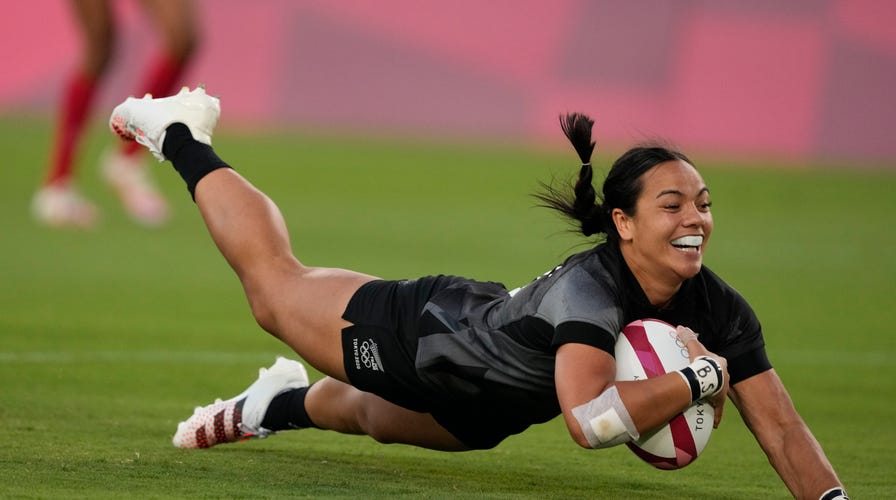Fox News Flash top headlines for July 31
Fox News Flash top headlines are here. Check out what's clicking on Foxnews.com.
After five long years, Portia Woodman has finally been able to shake the mental image of herself in tears, standing under the goalposts.
It was like grief for something lost, but it's been supplanted now by memories of happiness, hugs and, of course, a haka.
CLICK HERE FOR MORE SPORTS COVERAGE ON FOXNEWS.COM
Woodman's New Zealanders won a coveted Olympic title by beating France 26-12 on Saturday.
She’ll always have the memory of that 2016 final loss to Australia in Rio de Janeiro, because missing out on the first Olympic gold medal ever awarded in women's rugby sevens was the motivating force for everything that has come since.
"Looking back on Rio, that emotion of scoring the last try but still not being able to win the game, crying underneath the posts, is definitely one that I've looked back on," the 30-year-old Woodman said, before holding up her gold medal. "But now it's gone."
The bad memories will never be at front of mind again, she said, "Not when I look at this!"
Woodman has had to overcome an Achilles injury that may have ended her Olympic dream if the Tokyo Games weren’t delayed last year because of the coronavirus pandemic.
She led the scoring charts in the 2016 Olympics, but shared around the tries fairly evenly this time with teammates Michaela Blyde, who topped the list with seven, and Gayle Broughton and Stacy Fluhler, who also scored five.
France had been unbeaten in five games but was never in front against New Zealand.
"We really wanted to get the gold and impose our way of playing, but it was very complicated with a lack of possession," France captain Fanny Horta said. "We have to be proud of what we have achieved.
"You need to be able to congratulate yourselves if you are on the podium at an Olympic Games, irrespective of the medal."
Top-ranked New Zealand, the world sevens series and World Cup sevens champions, had some close calls. In the group stage, the Black Ferns had to rally from a three-try deficit to beat Britain 26-21. Their semifinal went to golden-point extra time after Fiji scored in the last minute equalize at 17-all.
CLICK HERE TO GET THE FOX NEWS APP
It was only one step further up the podium in Tokyo, but a giant leap for the kind of diehard rugby fans who populate New Zealand. The players sang the anthem on the podium, then did a haka on the sideline to cap off the tournament. New Zealand's men took silver earlier in the week, five years after missing the medals in Rio. The women's team bettered them again.
Another Pacific nation where rugby is central to life picked up a second medal at the game, with Alowesi Nakoci scoring two tries and making two try-saving tackles as Fiji beat Britain 21-12 in the bronze medal playoff.
It was the first Olympic medal ever for Fijian women. The Fijian men’s team has won back-to-back Olympic titles.
"I think after what we went through as a team, we deserved it," Fiji player Viniana Riwai said of the bronze.
The Fijian squad has been in camp since the first week of April, unable to see their families because of surging COVID-19 cases in their Pacific island nation.
"We feel emotional, with what is going on in Fiji right now," Riwai said. "We dreamed about this, and we won’t forget this moment."
The medals for France and Fiji meant there were two new countries on the podium in the women's tournament, with 2016 champion Australia finishing fifth and Canada, the bronze medalist in Rio, failing to reach the quarterfinals.
The Australians had a 17-7 win over the U.S. women to clinch fifth a day after the Americans rallied from 12 points down to win their group-stage decider.
China beat the Russian team 22-10 in a seventh-place playoff between two countries making their debuts in rugby sevens.
The two new teams finished above Canada, which took ninth place with a 24-10 win over Kenya. Brazil closed with a 21-12 win over Japan, relegating the host team to last place.
The Japanese women’s team formed a line and made a ceremonial bow toward the main grandstand, getting some polite applause. It has been a difficult tournament for Japan, which was unable to use home ground advantage to improve on its performance in Brazil.

